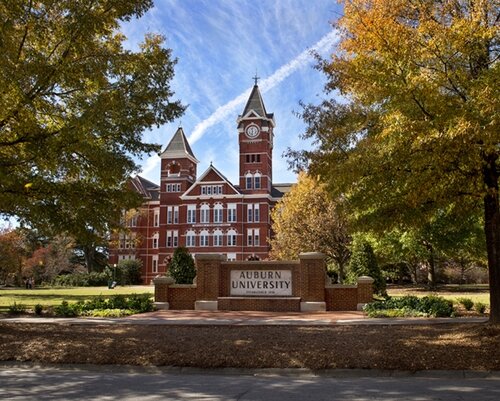Auburn University Board of Trustees Reviews and Accepts Proposals for Multiple Construction and Capital Projects
The Auburn University Board of Trustees took action to move forward with several construction and capital projects at its Nov. 17 meeting.
Among the projects, the board initiated a plan to construct an air traffic control tower at the Auburn University Regional Airport and accept the recommendation to hire Barge Design Solutions Inc.’s Dothan, Alabama, office as the project engineer. Airport officials expect the tower to provide much-needed coordination between incoming and departing traffic, thus enhancing airspace safety and efficiency.
This project will be financed by federal, state and local government funds and will help streamline and manage the airport’s nearly 100,000 flight operations each year.
“This is related to good news, because the School of Aviation is growing and our community’s growth has brought more people and aircraft into the area,” said Bill Hutto, Auburn University Regional Airport director. “This is a safety-oriented project, and it also will increase efficiency. When you have 95,000 flying operations a year, it gets to be a very busy flying environment, and the air traffic control tower will allow us to sequence and space the aircraft properly.”
The board also accepted a proposal to create a new Master of Science in Artificial Intelligence Engineering in the Department of Computer Science and Software Engineering in the Samuel Ginn College of Engineering. The new degree program will address a statewide and national workforce demand for trained AI professionals in intelligence, machine learning and natural language processing.
University leaders also reported several recent rankings accolades for Auburn and Auburn University at Montgomery (AUM). Auburn recently was ranked 93rd in U.S. News & World Report’s “Best Colleges” edition — a four-spot increase from 2022 — as well as among the top 20 institutions in the country for online education by Newsweek. In addition, U.S. News & World Report ranked AUM 29th among regional public universities in the south, its best showing to date.
In other matters, the board:
- Watched a video that touted the capabilities of a major research center within Auburn’s Samuel Ginn College of Engineering that has been renamed the Auburn University Neuroimaging Center to highlight its renewed focus on solving critical neurological health challenges. The center is focused on advancing the latest in neuroscience research and leveraging the university’s expertise in engineering, sciences and veterinary medicine with the use of advanced magnetic resonance imaging.
- Granted final approval to renovate the Lowder Hall advising suite. The Harbert College of Business proposed updating 6,500 square feet of space in the existing academic advising suite to accommodate the growth of student enrollment and improve departmental efficiency. The estimated total project cost of $5.5 million will be financed by the college.
- Initiated a project to renovate the Caroline Draughon Village (CDV) laundry facility to become a new fieldhouse for Recreation and Wellness and named Seay, Seay, and Litchfield of Auburn as project architect. The CDV laundry facility was constructed in 1959 and served CDV occupants until the residences were demolished in 2007. This project proposes to renovate the facility to create public restrooms, offices, equipment check-out and storage spaces to serve the adjacent intramural tennis and pickle ball courts. The project will be financed by Recreation and Wellness.
- Granted sole source authority and the authority to purchase materials for public works projects to President Christopher B. Roberts, who can then delegate the authority to Facilities Management. In its recent legislative session, the State of Alabama Legislature passed a bill that amended Title 39-Public Works of the Code of Alabama. Title 39 details the requirements to be followed on all state, county and municipal public works contracts. Auburn University is required to follow the process and procedures stated in this law on its construction projects. After reviewing these amendments, the Office of General Counsel advised the Board of Trustees to grant sole source authority and the authority to purchase materials for public works projects to the president, who could then delegate the authority to Facilities Management.
- Authorized the College of Human Sciences to commence fundraising and capital project planning in support of a project(s) to improve the college’s facilities. The college occupies several buildings on campus including Spidle Hall, M.W. Smith Hall, the Poultry Sciences Building, Haley Center, Duncan Hall, Dawson Hall, the Halliday Cary Pick House and the Tony and Libba Rane Culinary Science Center. Due to the condition of some of these facilities, it is anticipated that the university will need to, at some point in the future, undertake a construction project or a set of construction and renovation projects to replace Spidle Hall and other facilities.
- Also, in the Department of Electrical and Computer Engineering, the board accepted a proposal to close the Bachelor of Wireless Engineering program. As the industry has evolved, the department can support these educational activities through other degree programs. An appropriate teach-out plan has been developed, and once approved, the closure will go to ACHE and SACSCOC for appropriate notification.
- Endorsed the proposed requests for approval of The Union Housing Complex rates for the 2024-25 Academic Year.
For Auburn University at Montgomery (AUM), the board:
- Agreed to allow AUM to sell a parcel of land on Hyundai Boulevard in Montgomery that no longer offers any strategic need for the university. The proceeds from this sale will generate revenue and other benefits that could support the capital needs of AUM, including the development of an academic and research center on its campus.
- Accepted a proposal to create a Master of Social Work in the College of Liberal Arts and Social Sciences. The goal is to provide students with the skills they need to help prepare for advanced clinical social work practice by providing a curriculum built from a trauma-responsive, social justice-informed perspective. The proposed degree program would help meet the growing demand for social workers presently unmet by current programs across the state.

